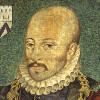“ The brute first knows death when it dies, but man draws consciously nearer to it every hour that he lives ”
Arthur Schopenhauer, The World as Will and Representation (1819). copy citation
| Author | Arthur Schopenhauer |
|---|---|
| Source | The World as Will and Representation |
| Topic | death living |
| Date | 1819 |
| Language | English |
| Reference | |
| Note | Translated by R. B. Haldane and J. Kemp |
| Weblink | http://www.gutenberg.org/files/38427/38427-h/38427-h.html |
Context
“It is by the help of language alone that reason accomplishes its most important achievements,—the united action of several individuals, the planned co-operation of many thousands, civilisation, the state; also science, the storing up of experience, the uniting of common properties in one concept, the communication of truth, the spread of error, thoughts and poems, dogmas and superstitions. The brute first knows death when it dies, but man draws consciously nearer to it every hour that he lives; and this makes life at times a questionable good even to him who has not recognised this character of constant annihilation in the whole of life. Principally on this account man has philosophies and religions, though it is uncertain whether the qualities we admire most in his conduct, voluntary rectitude and nobility of feeling, were ever the fruit of either of them.”
source



